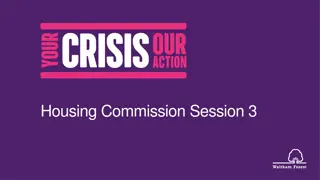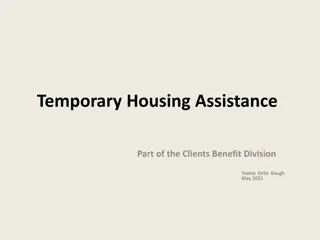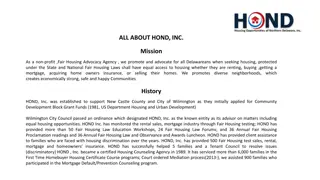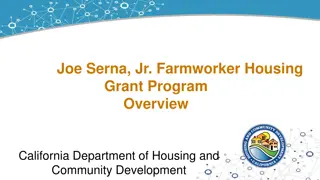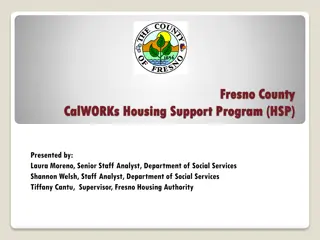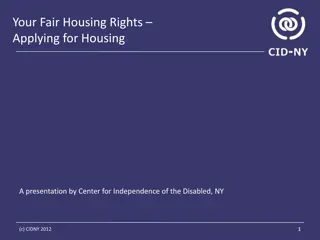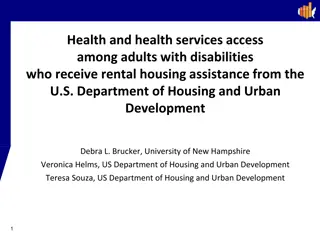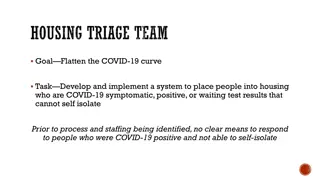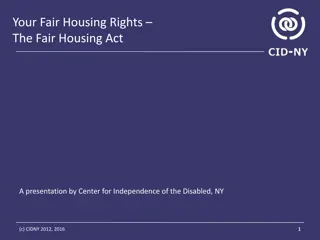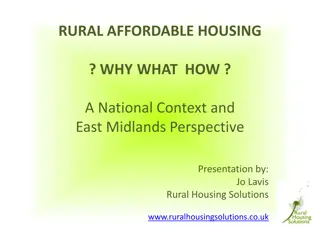Empowering Individuals with Disabilities through Housing Access Services
Empowering individuals with disabilities, Housing Access Services (HAS) was initiated in 2009 as a partnership between Arc Minnesota and the Department of Human Services Housing Division. HAS assists with housing searches, financial burdens, and coordinates housing access for individuals eligible for MA Home Care Services. Over the years, HAS has evolved to support a broader range of waivers and eliminated restrictions on where individuals can live, aligning with the Olmstead Plan. Additionally, HAS can provide assistance to individuals seeking their own housing options.
Download Presentation

Please find below an Image/Link to download the presentation.
The content on the website is provided AS IS for your information and personal use only. It may not be sold, licensed, or shared on other websites without obtaining consent from the author. Download presentation by click this link. If you encounter any issues during the download, it is possible that the publisher has removed the file from their server.
E N D
Presentation Transcript
HOUSING ACCESS SERVICES A partnership between Arc Minnesota and The Department of Human Services, Housing Division
HISTORY Housing Access Services (HAS) was started in July of 2009. It started as a contract between The Arc and DHS, Disability Services Division. In 2018, it was converted into DHS Housing Division. Housing Access Services was started to help bridge the gap for people with disabilities that wanted to have more of a choice where they lived. HAS was needed to help with navigating housing searches (finding/searching for housing, applications, speaking with landlords etc.) and the financial burden of one time moving-related costs.
CURRENT DEMOGRAPHICS AND HOW AND WHY THEY HAVE CHANGED HAS started out serving people who were currently receiving or eligible for: Brain Injury Waiver (BI) Community Alternative Care Waiver (CAC) Community Access for Disability Inclusion Waiver (CADI) Developmental Disabilities Waiver (DD) Alternative Care Program (AC) Elderly Waiver (EW) MA Home Care Services such as PCA, PCA Choice, Private Duty Nursing, ARMHS, or SILS.
CURRENT DEMOGRAPHICS AND HOW AND WHY THEY HAVE CHANGED HAS was changed to exclusively work with people who were receiving or eligible for MA Home Care Services because people on eligible waivers have Housing Access Coordination (HAC) as a billable waivered service. We have been receiving more ARMHS individuals than in the beginning. Part of this is due to outreach with PCA and ARMHS agencies. Arc was able to start providing HAC starting July of 2017. Changes that were made to the HAC program in 2016 were implemented because of HAS and tracking what we did with a couple of our movers.
HOW THE RESTRICTIONS ON WHERE PEOPLE CAN LIVE HAS CHANGED Originally HAS started with the idea that people should only live in independent housing, interpreted as: Having less than seven people with disabilities in a building No provider owned/controlled housing. This also included no public housing high rises because of the seven-person limit rule as interpreted by DHS. This was very limiting for people that needed more affordable housing. It has gradually evolved to meet the standards of The Olmstead Plan. Now people can move to independent housing, where they want, as long as the building is not provider controlled.
HAS CAN STEP IN IF PEOPLE FIND THEIR OWN HOUSING If people find their own housing, depending on the stage they are in, we can help. It really varies with what the person needs. Some things we can assist with are(not an exhaustive list): Helping them to figure out and meet with their team about independent living Figuring out a budget/budgeting their current expenses Filling out their application Bring them to the section 8 office(if they have a voucher) Coordinate paperwork (Getting income verification i.e. SSI/SSDI/SNAP/MFIP/ Paystubs) Bring them to a walkthrough or meeting with a landlord Coordinate moving trucks/packing Pay for furnishings, Bridging referrals and/or a deposit All of this is dependent on where the person is in their stage of finding a place and what they would like from us. We do as much or as little as the person wants. We always take the lead from the person as this is their search and they are dictating the process. Please note that our funding capacity is very low at this time.
HOW WE FIND RENTAL PROPERTIES We find apartments in a number of ways: We do a lot of online searching using apartment websites (Rent411, HousingLink, Apartments.com, etc), Community websites (City Pages, craigslist) Different housing guide magazines (Senior Housing Guide) Leads from past landlords or connections that we have Common leasing company websites and more After we have a couple numbers, we start calling the apartment complexes and seeing if they have openings. We also drive around in the area that people want to live and see what has availability. Sometimes mom and pop apartments do not advertise, even on craigslist. They will put out signs on the property. We will either take down names and numbers or we will go into the office if they have office hours.
NEGATIVE HISTORY INCOME/BAD CREDIT Negative histories can be a rental barrier. We have been able to get around some negative histories by: Working with the landlord so they understand our program If the person does not meet a property owner s income guidelines (ex. 2x rent as income), we work with the property owner to set up direct deposits or tell them that their income (if on SSI or SSDI etc) is not dependent on whether the person is employed. Income guidelines at a property that accepts Section 8 or other vouchers should be based on the portion of rent paid (30-40% if income) and not on the total rent. If the property owner refuses, a Request for a Reasonable Accommodation can be made under the ADA.
NEGATIVE HISTORY EVICTION/UD Evictions and Unlawful Detainers can be difficult to overcome, especially if they are recent. The best thing to do here is to present the facts prior to the background check. Rep-payees can assist with making landlords a little more comfortable because there is another person there to ensure they get paid Setting up a rep payee if the person has a history of late rental payments. The rep payee can also help if the person has a UD/eviction for non-payment or a bad credit history. Presenting the situation about the UD/eviction can help to put it into context. Look into seeing if it is something that may be expunged. We have partnered with Volunteer Lawyers Network when looking at an expungement due to criminal history and UDs
NEGATIVE HISTORY ADDITIONAL DOCUMENTATION Again, if the person has a UD or bad credit history, showing them that the person has made changes in their lives can help. This includes documentation of relevant: Treatment Letters of reference from health care professionals History of AA attendance Compliance with terms of probation, etc. Paying rent on time since the UD/Consistency with other bills
NEGATIVE HISTORY - CRIMINAL Criminal histories, depending on the type of charge and the date of occurrence, can greatly affect the success of the application for tenancy. We can get letters from: Transitional housing Half way houses Sober living Parole officers Proof that they completed a program (AA, NA, community service etc) Coaching the individual how to meet with the landlord Helping them to draft a letter talking about their past criminal history and the changes that they have made to give to the landlord prior to the background check





